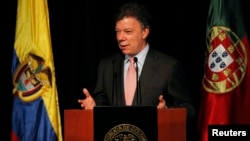Colombia will not enter peace talks with the country's second-biggest guerrilla group, the ELN, until it releases captives including a Canadian citizen held hostage since January, President Juan Manuel Santos said on Thursday.
The National Liberation Army, a rebel group with about 3,000 fighters known as ELN, has expressed interest in seeking a peace accord similar to the one being discussed in Cuba with the Revolutionary Armed Forces of Colombia, or FARC.
The ELN seized Canadian geologist Jernoc Wobert in northern Bolivar province along with two Peruvian and three Colombian miners contracted by gold mining company Braeval Mining . His five colleagues were later freed by the rebels.
“Eventually, if the ELN decides to enter, and for us to agree, it has to free its captives, above all the Canadian it holds,'' Santos said during an address to soldiers in Bogota.
The FARC has been hammering out peace terms with government negotiators since November to bring an end to five decades of war that has killed more than 100,000 people. The government wants a peace agreement signed by the end of this year.
Santos' demands come a day after the ELN conditioned Wobert's release on Braeval Mining handing over mining rights to people living close to its installations in northern Colombia.
The rebel group, like the FARC, objects to foreign companies exploiting the land and damaging the environment. Both insurgent groups want the government to change the way it deals with overseas investors, something the government has refused to consider.
Colombia, a nation of 46 million, has attracted record foreign direct investment in recent years as government troops push the ELN and FARC guerrilla groups deeper into the thick jungles and make it harder for them to launch attacks.
But the rebels have managed to remain relevant, striking at oil and mining companies and causing damage to the nation's economic drivers.
The ELN, inspired by the Cuban revolution and established by radical Catholic priests, has battled a dozen governments since it was founded in 1964. It has sought peace before, holding talks in Cuba and Venezuela between 2002 and 2007.
The National Liberation Army, a rebel group with about 3,000 fighters known as ELN, has expressed interest in seeking a peace accord similar to the one being discussed in Cuba with the Revolutionary Armed Forces of Colombia, or FARC.
The ELN seized Canadian geologist Jernoc Wobert in northern Bolivar province along with two Peruvian and three Colombian miners contracted by gold mining company Braeval Mining . His five colleagues were later freed by the rebels.
“Eventually, if the ELN decides to enter, and for us to agree, it has to free its captives, above all the Canadian it holds,'' Santos said during an address to soldiers in Bogota.
The FARC has been hammering out peace terms with government negotiators since November to bring an end to five decades of war that has killed more than 100,000 people. The government wants a peace agreement signed by the end of this year.
Santos' demands come a day after the ELN conditioned Wobert's release on Braeval Mining handing over mining rights to people living close to its installations in northern Colombia.
The rebel group, like the FARC, objects to foreign companies exploiting the land and damaging the environment. Both insurgent groups want the government to change the way it deals with overseas investors, something the government has refused to consider.
Colombia, a nation of 46 million, has attracted record foreign direct investment in recent years as government troops push the ELN and FARC guerrilla groups deeper into the thick jungles and make it harder for them to launch attacks.
But the rebels have managed to remain relevant, striking at oil and mining companies and causing damage to the nation's economic drivers.
The ELN, inspired by the Cuban revolution and established by radical Catholic priests, has battled a dozen governments since it was founded in 1964. It has sought peace before, holding talks in Cuba and Venezuela between 2002 and 2007.





